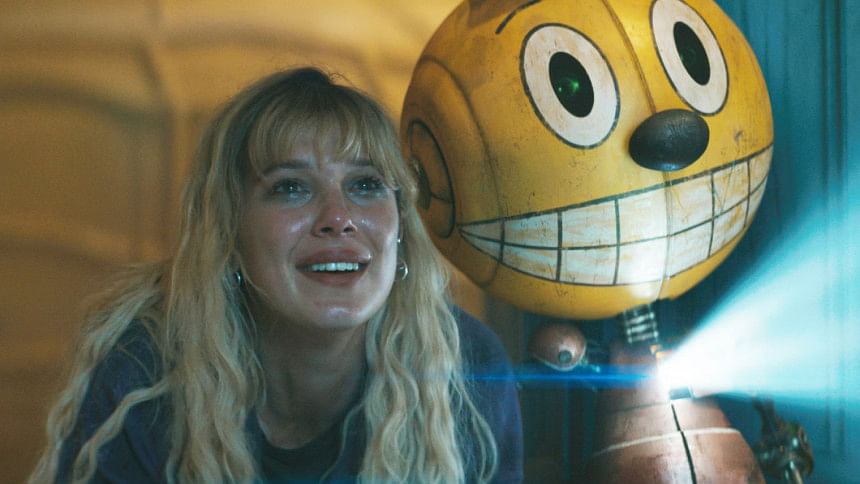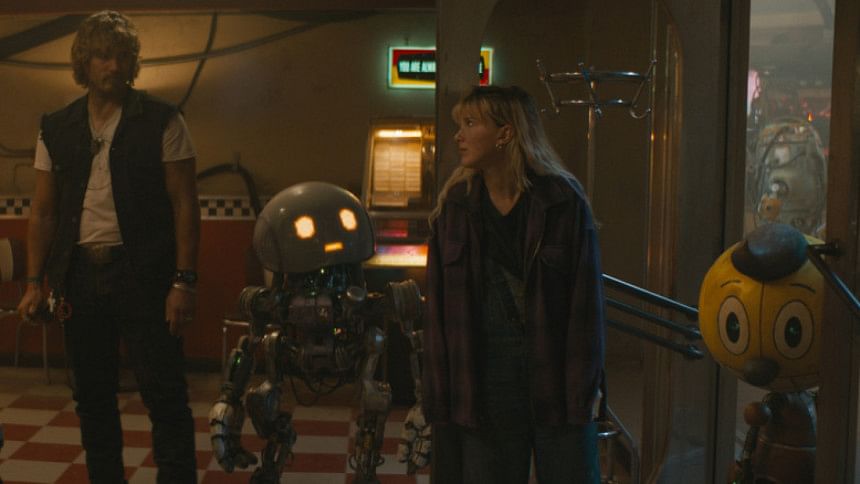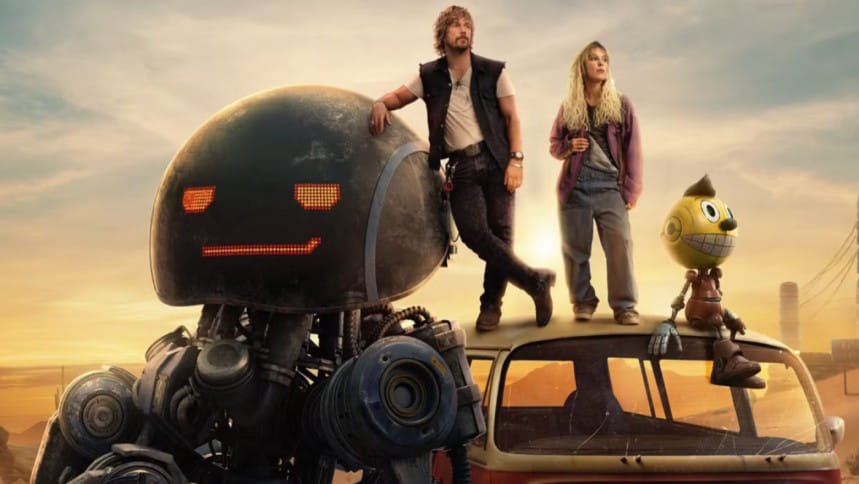‘The Electric State’ and its missed connections
This year “The Electric State” arrived as one of Netflix’s most expensive gambits, a film burdened not only by a budget that exceeds $300 million but also by a creative lineage that promises much. The Russo brothers, known for their mastery of blockbuster spectacle in the Marvel Cinematic Universe (MCU), bring their vision to a film set against the dystopian backdrop of a desolate, near-future world where robots and humanity are in a state of uneasy coexistence. Based on the acclaimed illustrated novel of the same name by Simon Stålenhag, the film stars Millie Bobby Brown, Chris Pratt, and Anthony Mackie. Despite the star power, the enormous investment, and the high expectations surrounding its release, “The Electric State” struggles to live up to its ambitious premise, leaving us to wonder where it all went wrong.
The first impression upon beginning the film is one of unease. The storyline, ostensibly a coming-of-age tale set in the aftermath of a catastrophic conflict between humans and robots, quickly becomes difficult to navigate. It is set in 1997, after the so-called “Robot Wars,” but the film’s version of the future is murky and undefined. This lack of clarity, paired with an overstuffed narrative that races through different plot points at breakneck speed, makes it almost impossible to get a handle on the world the film seeks to create. The protagonist, an orphaned girl searching for her missing brother in a desolate West Coast, is swept up into a convoluted conspiracy involving rogue robots and the dangerous technological advances that led to their banishment. Along the way, she is joined by a motley crew of characters, including a grizzled smuggler and a robotic sidekick with an attitude, in a story that feels like it is trying to juggle too many ideas at once without ever quite connecting.

The plot, which might have worked in the hands of a more restrained storyteller, feels weighed down by the sheer volume of ideas that the film tries to explore. The human-robot relationship is central, but the exploration of this dynamic is clumsy and often superficial. The film attempts to discuss the dependency of humanity on technology, the erosion of human agency in the face of mechanised intelligence, and the eventual obsolescence of both man and machine. Yet, these themes are only ever skimmed over, never fully explored or integrated into the characters’ emotional journeys. The result is a film that feels like a disjointed collage of philosophical musings, genre tropes, and melodrama that never quite settles. What should be a meditation on the nature of progress and human identity in a rapidly evolving technological landscape instead comes across as an uneasy combination of confused allegory and sci-fi tropes.
Part of the difficulty with “The Electric State” lies in its pacing and structure. The film moves rapidly from one set-piece to the next, never allowing time for the characters to breathe or for the audience to connect with them on an emotional level. The film’s early moments are saturated with a sense of frantic energy as if it is desperately trying to make an impression with the sheer volume of visual spectacle and frenetic action. But this hurriedness undermines the emotional resonance that the film could have achieved, leaving its characters feeling more like pawns in a larger narrative game rather than people with agency or depth. The film’s attempt at world-building is similarly rushed, with little time devoted to fleshing out the specifics of this future world or giving the viewer a reason to care about its fate. Instead of creating a rich, immersive universe, it often feels like a series of disconnected vignettes that don’t quite add up to anything substantial.

The performances, while notable for the star-studded cast, are similarly uneven. Millie Bobby Brown, playing the central role of the orphaned girl, brings a certain intensity to the part, but her character is so thinly written that it is hard to fully invest in her journey. There is a sense of emotional detachment throughout the film as if the characters are simply going through the motions of a script that never quite delivers the payoff it promises. Anthony Mackie, as the voice of the robot sidekick, delivers a performance that is both charming and annoying in equal measure. The dynamic between Brown and Mackie could have been one of the film’s saving graces, but it never fully materialises, as the film struggles to find a balance between humour and gravitas. The supporting cast, which includes Chris Pratt, Stanley Tucci, Giancarlo Esposito, and several others, also fares unevenly. Some deliver performances that feel forced or underdeveloped, while others—like Esposito’s turn in metallic drag—feel more like cameo appearances than meaningful contributions to the story. This eclectic mix of talents, rather than lending the film a sense of dynamism, only highlights its lack of direction. It is as though the filmmakers simply threw together a collection of familiar faces, hoping their presence would imbue the film with some kind of magic, but the result is a hodgepodge of talent that never quite gels.
In terms of its visual design, “The Electric State” offers some striking moments, particularly in its depiction of the robots and the dystopian landscapes. The film’s CGI-heavy aesthetic is one of its few redeeming qualities, with its images of crumbling cities, mechanical creatures, and abandoned highways evoking a haunting sense of loss and decay. There is a certain melancholic beauty to the film’s world, which is populated by robots who once fought for humanity and then were abandoned by the very people they sought to protect. Yet, for all its visual flourishes, the film never fully capitalises on the potential of its setting. The tone, rather than being one of poignant reflection on the perils of unchecked technological advancement, feels desperate and overblown. The film’s attempts at nostalgia, invoking the energy of 1990s cinema and popular culture, never quite land, as the emotional resonance of those references is overshadowed by the overwhelming sense of confusion that permeates the film.

It is perhaps this sense of desperation that most define “The Electric State”. There is a feeling throughout the film that it is trying too hard—too hard to be profound, too hard to be nostalgic, too hard to be exciting. This is a film that was made with the best of intentions, but those intentions are often lost beneath the weight of the film’s ambition. The Russo brothers, who have demonstrated a deft touch with blockbuster filmmaking, seem here to have succumbed to the trap of overindulgence, believing that a massive budget and a starry cast could somehow mask the lack of a clear, cohesive vision. But in the end, the film’s flaws are too glaring to be covered up by spectacle alone.
If anything, the film stands as a cautionary tale of how excess can lead to creative paralysis. With such an enormous budget, it had every opportunity to break new ground in terms of storytelling, world-building, and emotional depth. Instead, it becomes a sprawling, unfocused narrative that never fully realises its potential. The film is not a failure in the sense that it lacks ambition or creativity — it is quite the opposite. It fails because it is unable to channel its considerable resources into something meaningful, opting instead for a spectacle that lacks the emotional depth and narrative cohesion that a film of this scale demands.
In the end, “The Electric State” might best be described as an attempt at capturing the zeitgeist of a particular moment—a moment defined by technological anxiety, rapid societal change, and the relentless march of progress. Yet, for all its attempts to tap into these themes, it feels strangely out of step with the world it seeks to depict. Its world is one of despair and confusion, and in that respect, it mirrors its filmmaking process. The film is ultimately a missed opportunity, a collection of great ideas and talented people that never quite come together into a cohesive whole. The truth is, the film’s electric state is one of flickering hope and stuttering progress, never quite reaching the high-voltage charge it so clearly aspires to.
LondonGBDESK//



Comments are closed.